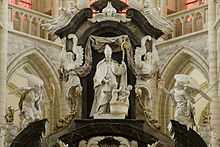Mattheus van Beveren

Mattheus van Beveren (alternative names: Mathieu Van Beveren, Mathieu Beveren, Matthieu Beveren) (c. 1630, Antwerp – after 21 January 1696, Brussels) was a Flemish sculptor en medalist who is mainly known for his monumental Baroque church sculptures and small wood and ivory sculptures.
Life
Details about his life are scarce. He likely trained with the Antwerp sculptor Pieter Verbrugghen I.[1] He joined the Antwerp Guild of St. Luke in 1649/50.[2] He was the mint superintendent of Antwerp in the 1670s and 80s.
He married Suzanna Dooms, by whom he had a son named Judocus and a daughter named Catherina who married the flower still life painter Nicolaes van Verendael.[2][3]
Mattheus van Beveren ran a large sculpture workshop with a significant output. Mattheus van Beveren was highly recognized for his artistic work and contributions as an instructor.[4] He trained Jan Baptist Santvoort.[2]
Work

Van Beveren was a versatile artist in terms of the subject range of his sculptures as well as the materials in which he worked. He executed monumental works in marble, stone and wood as well as small-scale works in wood, ivory and terracota. He further was a medalist and produced designs for dies for the Antwerp Mint.[1] Van Beveren's style combines the classicist tendency of the Brussels sculptors Jerôme Duquesnoy (I) and his son François Duquesnoy with the baroque realism of his Antwerp contemporaries Pieter Verbrugghen II and Artus Quellinus the Younger who were more influenced by the style of Rubens.[1]
His subject matter was mainly religious but he also worked on portraits and allegorical subjects. An example of the latter is the group of allegorical figures representing Virtue, Fame and Time created for the funerary chapel of Duke Lamoral of Thorn and Taxis (in the Our Blessed Lady of Zavel Church in Brussels) of which a terracotta model is kept at the Royal Museums of Fine Arts of Belgium in Brussels.[5][6]
He executed the main altar in the St Nicholas Church in Ghent.[7] He collaborated with some of the leading Flemish sculptors in the execution of large religious sculptures. He assisted Lucas Faydherbe with the painted wood and stone high altar in the St Rumbold's Cathedral in Mechelen.[1] He made an Angel throne for the Antwerp Cathedral (1659-1660) after a design by Artus Quellinus the Younger.[8]
His designs were used by his large workshop and other contemporary artists in the creation of numerous sculptures. The Brussels sculptor Jan Cosyns, for instance, sculpted the marble statues for the funerary chapel of Duke Lamoral of Thurn and Taxis after a design by van Beveren.[9]
Matheus van Beveren was known for his small-scale works, and in particular his ivory sculptures.[4] Beautiful examples are the Cupid on a lion in the Metropolitan Museum of Art and the Maria Apocalyptica in the Rijksmuseum.[10][11] He and his workshop often used paintings by Rubens as models for numerous ivory crucifixes.[12]
Selected works
- 1665: Pillar monument of Gaspard Boest in the Church of St. Jacob in Antwerp.
- 1677-1678: Main altar of the Church of St. Nicolas in Ghent.
- 1678: Marble tomb monument for Lamoral Claude-François, Count of Thurn and Taxis in the Our Blessed Lady of Zavel Church in Brussels.
- 1681-1684: Wooden pulpit of the Church of Our Lady in Dendermonde.
- Oak doors for the entrance to the Augustinian monastery in Tienen.[13]
References
- ↑ 1.0 1.1 1.2 1.3 Cynthia Lawrence. "Beveren, Mattheus van." Grove Art Online. Oxford Art Online. Oxford University Press. Web. 17 Feb. 2014
- ↑ 2.0 2.1 2.2 Biographical details at the Netherlands Institute for Art History (Dutch)
- ↑ Biographical details at the Biographie Nationale de Belgique (French)
- ↑ 4.0 4.1 Mattheus van Beveren (1630-1690) Flemish Ivory Carver at Ivory Experts
- ↑ Terracotta model of Virtue, Fame and Time created for the funerary chapel of Duke Lamoral of Thurn and Taxis in the Royal Museums of Fine Arts of Belgium
- ↑ Funeral Monument of Lamoral
- ↑ Main altar in the St Nicholas Church in Ghent (Dutch)
- ↑ ‘Angel-throne’ in gilt and silvered wood
- ↑ J.-P. Esther. "Cosyns, Jan." Grove Art Online. Oxford Art Online. Oxford University Press. Web. 4 Mar. 2014
- ↑ Cupid on a lion in the Metropolitan Museum of Art
- ↑ Maria Apocalyptica in the Rijksmuseum
- ↑ Johan Decavele, et al. "Belgium." Grove Art Online. Oxford Art Online. Oxford University Press. Web. 4 Mar. 2014
- ↑ Terracotta maquette of the oak doors for the entrance to the Augustinian monastery, Royal Museums of Fine Arts of Belgium, Brussels
| Wikimedia Commons has media related to Mattheus van Beveren. |